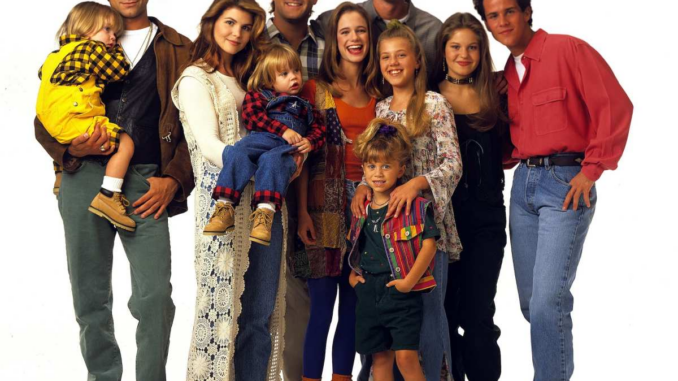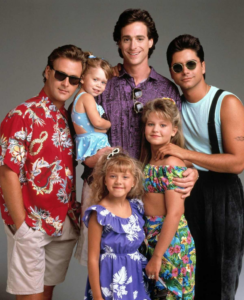
For decades, Full House has been celebrated for its heartwarming moments, comedic antics, and family-friendly values. But recently, the cast has stirred curiosity by sharing their thoughts on LGBTQ+ representation and how some characters might have been written today. Let’s dive into the fascinating theories and what they reveal about the timeless sitcom.
Revisiting ‘Full House’ Through a Modern Lens
How Times Have Changed
In the late 80s and early 90s, LGBTQ+ representation was nearly absent from mainstream sitcoms. Shows like Full House focused on traditional family dynamics, but that doesn’t mean its characters can’t be viewed differently today.
Why the Question Came Up
In recent interviews, cast members were asked to reimagine their characters in today’s world. This led to some candid discussions about which roles might reflect LGBTQ+ identities if the series were reimagined.
Cast Theories on LGBTQ+ Representation
Stephanie Tanner: A Free Spirit With Endless Possibilities
Jodie Sweetin’s Thoughts
Jodie Sweetin, who played Stephanie Tanner, has hinted that her character might have embraced a fluid identity in a more contemporary setting. Her adventurous spirit and non-conformity make this theory compelling.
Kimmy Gibbler: The Quirky Best Friend
Andrea Barber’s Take
Andrea Barber believes Kimmy’s eccentric personality and unapologetic uniqueness could have easily translated into LGBTQ+ representation.

Joey Gladstone: The Sensitive Uncle
Dave Coulier’s Perspective
Joey’s nurturing nature and lack of a traditional romantic storyline sparked discussions among fans and cast members about his potential to be a queer character in today’s storytelling landscape.
LGBTQ+ Subtext in the Show
Reading Between the Lines
While Full House didn’t explicitly address LGBTQ+ topics, moments of camaraderie and open-mindedness could be interpreted as subtle nods to inclusivity.
The Cultural Impact of These Theories
Why Representation Matters
Reflecting a Diverse Audience
Representation in media allows viewers to see themselves in the characters they love. Reimagining Full House through an LGBTQ+ lens underscores the importance of diversity in storytelling.
Fan Reactions to the Theories
A New Way to Connect
Fans have taken to social media to share their thoughts on these theories, many celebrating the openness of the cast to engage in these conversations.
Revisiting the Series with New Perspectives
A Timeless Appeal
Even decades after its original run, Full House continues to inspire new ways of thinking about its characters and themes.
How LGBTQ+ Representation Has Evolved in TV
The 80s and 90s vs. Today
Breaking Barriers Over Time
Shows like Full House paved the way for family-friendly content, but modern series are breaking barriers by including LGBTQ+ characters openly.
The Role of Nostalgia in Modern Representation
Reboots and Reimagining Classics
As shows like Fuller House revisit beloved characters, there’s an opportunity to integrate LGBTQ+ storylines that resonate with today’s audiences.
What This Means for Future Reboots
Could ‘Full House’ Be Rewritten?
Opportunities for Inclusivity
If Full House were rebooted, writers could explore LGBTQ+ identities more openly, reflecting the progress society has made.
Lessons from the Cast’s Theories
Encouraging Open Conversations
The willingness of cast members to share their thoughts encourages open-mindedness and inclusivity in entertainment.
Conclusion: A Legacy That Adapts
The discussions sparked by the Full House cast remind us that even classic shows can evolve with the times. By imagining LGBTQ+ identities for beloved characters, fans and cast members alike celebrate inclusivity and diversity. As we look back on Full House, it’s clear that its legacy isn’t just about family values—it’s about embracing everyone for who they are.
FAQs
- Were there any LGBTQ+ storylines in the original Full House?
No, the show didn’t explicitly address LGBTQ+ themes, but fans have reinterpreted certain characters through a modern lens. - Which character is most often theorized as LGBTQ+?
Stephanie Tanner and Kimmy Gibbler are frequently mentioned due to their unique personalities and openness. - Has the cast confirmed any characters as LGBTQ+?
No official confirmations have been made; these are simply fun theories shared by cast members. - How has Full House influenced modern family sitcoms?
Full House set a standard for heartwarming, family-centric storytelling, inspiring future shows to include more diverse representation. - Could LGBTQ+ themes appear in future Full House reboots?
Absolutely! A reboot could explore these themes to reflect today’s values of inclusivity and representation.
